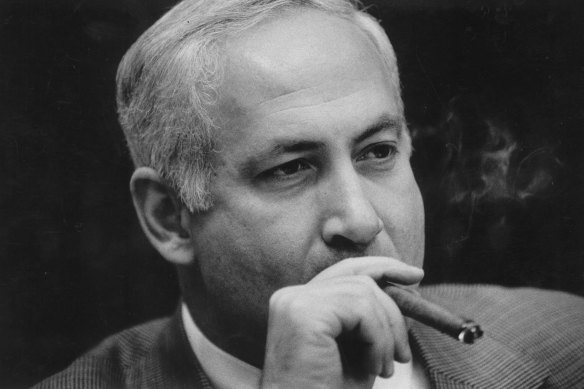
He’s both giving a performance for it, akin to the ones he’s shown delivering so forcefully elsewhere in his public life, and uneasy about the possibility that a surprise question or revelation could bring him undone. Which is what happens, repeatedly.
In one scene, he is presented with documentation that shows he had – via Qatar, because the Israeli banks refused to cooperate – channelled $35 million to Hamas on a monthly basis.

Israel’s prime minister Benjamin Netanyahu in September.Credit: AP
By way of justification, he quotes a fictional gangster, Al Pacino’s Michael Corleone in The Godfather Part II (1974), on the need to “keep your friends close and your enemies closer”.
And while Bloom’s interviewees can hardly be described as impartial, none of them seem unreasonable in their criticisms of Netanyahu’s policies and leadership style.

Documentary producer and director Alex Gibney. Credit: Andrew Brucker
Among those who appear are respected Israeli investigative journalist and longtime Netanyahu critic Raviv Drucker (who also produced the film with Gibney and Bloom); former Israeli prime minister Ehud Olmert (2006-09); Nimrod Novik, who was a chief adviser to prime minister Shimon Peres; journalist Nir Hefetz, once a spin doctor for Netanyahu; and former housekeepers at the prime ministerial residence.
It’s not without justification that Novik describes Netanyahu as “the one who fed the beast” and “the architect of chaos”.
And, in the context of what’s gone before, Bloom’s key thesis – that Netanyahu’s direction of the unrelenting bombardment of Gaza is primarily designed to shore up his political position and to serve as grounds for the postponement of his trial – is both deeply disturbing and very persuasive.
As the 19-year-old, softly spoken Gili Schwartz, a survivor of the 2023 massacre by Hamas militants at the Kibbutz Be’eri, puts it: “A forever war is beneficial to Netanyahu. It makes people feel they always need him.”
It emerges in the film that one of Netanyahu’s most outspoken supporters is his third and current wife, Sara, which elsewhere might appear to be a perfectly understandable case of spousal loyalty.
Here, however, she’s cast as a modern-day Lady Macbeth, whispering in his ear, encouraging his excesses and generally keeping him under her thumb. Her astonishing outbursts when pressed politely but purposefully by police interrogators do nothing to discourage such a view. And their elder son, Yair, emerges as a chip off both their blocks.

Benjamin Netanyahu.Credit: Alex Levac/Haaretz, via Madman/DocPlay
The film also establishes that Netanyahu’s pursuit of power has propelled him into unholy alliances with some very dubious far-right figures in Israeli politics.
As Gibney told Christiane Amanpour on CNN , production of the film began with the allegations of petty corruption against Netanyahu but ended up dealing with “the huge crime of using the unbelievable carnage in Gaza to solidify his personal position”.
However, despite the convincing case it builds about the threat the prime minister has been posing to Israel’s security and rule of law – or perhaps because of it – there are forces at work that have sought to bury The Bibi Files.
Loading
In September last year, when it was to be screened as a work-in-progress at the Toronto International Film Festival, Netanyahu’s lawyers petitioned – unsuccessfully – for an injunction preventing the screening.
They’ve since sought a court order to prevent any further showings of the leaked police videos. Given what they and the film reveal, such actions were only to be expected.
More troubling, however, is the fact that, while the film has been programmed at a few festivals (including the Jewish International Festival in Australia) and has been bought for theatrical distribution in several European countries, it’s been banned (apparently for privacy reasons) in Israel and hasn’t fared well in either the US or Australian marketplaces.
“No mainstream outlet will show the film in the US,” Gibney told Amanpour. As a result, there have only been limited screenings at independent locations. And although Madman has bought the local distribution rights, cinemas haven’t shown any interest. It’s now available in Australia only through the company’s adventurous streaming arm, DocPlay.
The competition between feature-length documentaries will be strong at the 97th Academy Awards ceremony in March. Among the other contenders are No Other Land, about life in the West Bank made by a Palestinian-Israeli collective, and two films about the war in Ukraine, the already acclaimed Porcelain War and Once Upon a Time in Ukraine. However, if The Bibi Files takes home an Oscar, wider distribution is likely to be a further reward.
The Bibi Files is streaming on DocPlay.



